I almost moved to Kirkland Lake, and I’ve always kind of regretted that it didn’t work out. Kirkland Lake is a neat little town that’s been described to me as the ‘wild west’ of northeastern Ontario.
Forty five kilometres east of the Québec border on Highway 66 (not Highway 11, we’re on a detour right now), Kirkland Lake is a largely anglophone town of about 10 000 8000, and is the largest town between North Bay and Thunder Bay on Highway 11.
Mines and Garbage
Kirkland Lake is extremely well known throughout Canada despite its small size and relatively remote location. Since gold was struck in the early 1900s, KL has been one of Canada’s most famous mining towns, complete with gold mines, drinking hotels, and highgraders. There’s a miner’s memorial as you come into town, which is actually quite classy and lists all the names of those who have died in mining accidents since the town began.
KL is also famous for Adams Mine – an abandoned open-pit mine that would have been the site for Toronto’s garbage, had the local community, First Nations, farmers and environmentalists not fought it so effectively. They were in the media, they wrote thousands of letters, they united many groups that had not worked together before.
Kirkland Lake is a story across Canada showing that no matter how small you may be if you do it right and smart – you can win. Adams Mine was seen as a huge story across Canada – so much so that the effort which started small eventually changed a lot of minds across southern Ontario. The provincial government put the plan to rest in 2003. The Grievous Angels, a band based in northern Ontario, wrote a song about it (the lyrics are here.)
Harry and Hockey and … other interesting stuff (that begins with the sound “wh”)
Kirkland Lake was named after Winifred Kirkland, a secretary at the old Ministry of Mines. (Ah to be an early provincial bureaucrat – you might get a town named after you.) Kirkland Lake, arguably, has it’s own suburb – King Kirkland – which consists of about 20 houses and trailers about ten minutes east of town on the highway.
Sir Harry Oakes is probably Kirkland Lake’s most famous and most wealthy citizen. American-born, he was a prospector who finally struck it big in KL after stints in California, Australia, and the Klondike. His mine in KL was the second largest gold mine in the Americas. By the 1920s, Harry Oakes was Canada’s richest individual. However in 1943, Oakes was allegedly murdered at his home in the Bahamas, and although fingers were pointed towards his son-in-law, no one was ever convicted of the crime. Today his former house is home to the Northern Ontario Museum in KL.
In terms of other famous KLers, Kirkland Lake was also once home to Growing Pains star Alan Thicke, figure skater Toller Cranston, and former NHL goalie Darren Puppa.
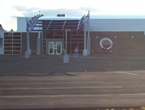 On the subject of hockey, Kirkland Lake used to be known as a hockey hotbed. CBC broadcaster Foster Hewitt used to call KL “the town that made the NHL famous” due to so many Kirkland Lakers filling the roasters of early NHL squads. Today KL is home to Hockey Heritage North, a museum that celebrates hockey and northern Ontario’s role in the NHL. Hockey Heritage North has a parkinglot that’s bigger than the museum itself – seemingly twice the size of the facility – and the parkinglot is probably a bigger draw for kids learning to ride bikes or for rollerblading and skateboarding. In three visits I’ve come to believe that Hockey Heritage North’s parkinglot is the nicest smoothest stretch of pavement in all of northern Ontario.
On the subject of hockey, Kirkland Lake used to be known as a hockey hotbed. CBC broadcaster Foster Hewitt used to call KL “the town that made the NHL famous” due to so many Kirkland Lakers filling the roasters of early NHL squads. Today KL is home to Hockey Heritage North, a museum that celebrates hockey and northern Ontario’s role in the NHL. Hockey Heritage North has a parkinglot that’s bigger than the museum itself – seemingly twice the size of the facility – and the parkinglot is probably a bigger draw for kids learning to ride bikes or for rollerblading and skateboarding. In three visits I’ve come to believe that Hockey Heritage North’s parkinglot is the nicest smoothest stretch of pavement in all of northern Ontario.
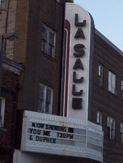
The place to see a show in Kirkland Lake. I mean a normal show. Don’t get any ideas. Those days are over.
Way back in the day, Kirkland Lake, however, was arguably almost as famous for its red house. KL had a reputation for being a party town, thanks in part to the mining boom and the many bachelors who ventured north to prospect and work. I have been told that one of the highlights of Kirkland Lake’s heyday was its internationally-known brothel. Soldiers from the area went to Europe to fight in World War One and regaled Europeans with tales of “the Red House of Kirkland Lake” or “5 Main Street” which was in fact a popular brothel well-known across the north. Supposedly the tales were so tall or so enthralling that other soldiers and even Europeans have actually come back to the area to visit Kirkland Lake’s red whorehouse. The house itself still standing but is no longer red.
Kirkland Lake: The Town
Kirkland Lake, to me at least, is a town of contrasts. When you enter the downtown along Government Road, it looks a bit like Huntsville in cottage country – a windy street revealing the town turn by turn, forming the backbone of an old but not pretty interesting little downtown. Actually, I like the downtown – it’s may not be “quaint” by some people’s standards but has character. With a decent downtown and as a town of 10 000, Kirkland Lake is big by Highway 11 standards. You don’t have to worry about whether there is a gas station or a liquor store. There are two hotels (HoJo and Comfort Inn), a Canadian Tire, a McDonald’s, a KFC, a Subway, a pizza shop, two Tim Hortonses (heck Timmins only has three!), a northern Ontario Chinese place, the Downtown Family Restaurant, and ‘The Zone’, which is a little club sort of thing in the basement of the local MP’s office.
Yet one could say that there is very little shopping. Other than Giant Tiger and Hart, that’s about it. No Zellers, no Walmart, one (and a half) grocery stores, a music shop, a pawn shop, and that’s it. The Kirkland Lake Mall has maybe about 20 shops and services. I guess you either go to Timmins, or to Rouyn-Noranda.
For a number of years, Kirkland Lake also had a significant Jewish community. As the mining boom spread northwards, Jewish families from Eastern Europe and even the United States moved up into the Englehart and Kirkland Lake area. Some settled as farmers in the area around Krugerdorf, while others formed the backbone of the commerce that fed Northeastern Ontario’s mining towns. A synagogue was built in 1927, with land donated by Sir Harry Oakes on Station Road. The community peaking in the late 1940s at a couple hundred members. Eventually, as the sons and daughters of the community moved southwards, and as fewer immigrants came north, the community shrank, and the synoguge was turned into apartments in 1980. Kirkland Lake’s original ‘Ark’ (I think that’s the wooden structure which holds the Torah) was eventually transported to the Beth Tikvah Synagogue in Toronto. While the community may have migrated, the history and the impact of Jewish immigrants lives long in the north, in places like Kirkland Lake, Iroquois Falls, Krugerdorf, and Timmins. Check out the virtual museum at the Kirkland Lake Jewish History link at the bottom of the page for first hand stories from community members. (Check out KL’s Jewish history here or here.)
Kirkland Lake today still has a bit of a reputation as a hard-scrabble town. The cyclical ups and downs of the mining and logging industries make Kirkland Lake a boomtown one decade and an economic sponge the next. Just like many towns in both northern and southern Ontario, as life in Northern Ontario requires a little assistance to get by the booms and busts of the economy. Like all mining towns, Kirkland Lake is a little rough around the edges. But that’s what makes places like this interesting, and unique. Like someone posted below, KL is a mining town, past, present, and future.
I have one beef with KL though, and I’ll get it off my chest now. The signs outside the town blatantly lie. They tell you it’s 15 kilometres to town and then 15 kilometres later you see a sign that says “Kirkland Lake 6 km” and then five minutes later you see another sign “Kirkland Lake 5 km.” Now I’m sorry, first off you’re lying the first time, and then the second time I was driving 90 kilometres an hour and I did not manage to go only one kilometre in that span of five minutes. It’s frustrating. Bad signage is one of my pet peeves in general.
I like Kirkland Lake. It has a lot of potential if marketed correctly. I’ll be back.
For an archive of the 40 comments that were posted to Highway11.ca’s profile of Kirkland Lake between 2008 and 2012, please click here.
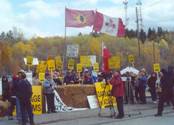
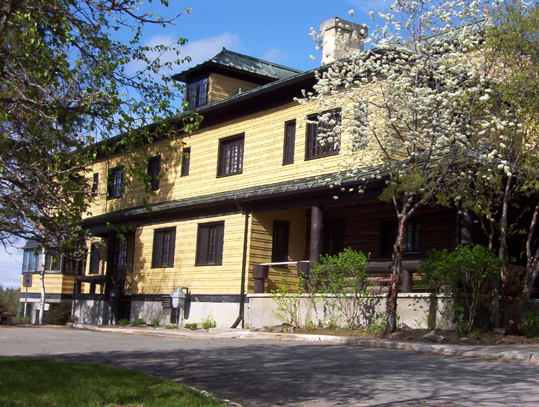

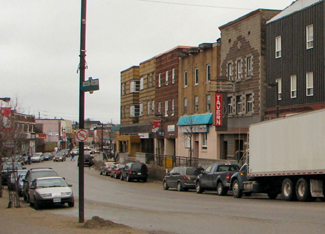
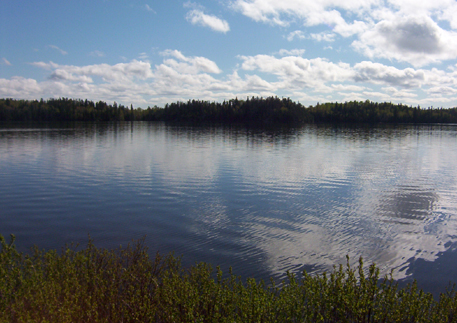
Growing up just outside of Englehart, at Gilpins Texaco Service Stn, it was always the dances in KL that my girlfriends and I wanted to go to. Every time!! They were the best. At the arena or the houndstooth in Kenogami. And then, how could I forget the Red Pines. Absolutely fantastic place. So damn much fun there. I had the opportunity to manager that wee KL Mall for 11 years before relocating out of province for a while but, I have and will always have a huge love for Kirkland Lake.
Just a comment from a former Kirkland Laker.
When my husband and I visited New York City back in 1999,
We were surprised to learn that the receptionist at the
Metropolitan museum knew where Kirkland Lake was.
In fact, she visited the town before.
Small world hein? Or should I say Hey?
I have left comments in sesekinika and kenogami after reading comments from people l knew back in the days!! I went toKlCVI.most everyone knew me as MAGOO. I have so many memories of highschool starting from the bus trip to Kirkland from sesekinika.l did spend a lot of time in the principals office. For those who knew me no surprise ha-ha.But believe it or not l did learn a few things.many wonderfull times spent in Kirkland and many wonderful friends.anyone remember me? Would love to hear from you.take care everyone. Pat Morin McGugan.
Hi Pat
I always wonder how you are and where you are.
We were great friends in high school. If it wasn’t you in the principal’s (Rockeby) office, it was me.
Drop me a line and let me know how you are. I’m also on
facebook
Pattie and Benda I remember you well from KLCVI grade 9 English.
Glad you are both well and send best wishes.
I am now in Muskoka not KL as this was my summer home for the 35 years I spent at KLCVI but obviously we all follow KL new
I’m anxious to get in touch with anyone who can help point me in the direction of environmentalists who perhaps could help me find help to fight a garbage dump that is to be within 600 meters northeast of my mountain farm. This post about Adam’s mine near Kirkland lake has helped relieve some of the anxiety as it gives me hope that I can make a difference.
If there is any reference information that could be passed on to me, I would greatly appreciate it. Even though I am quite an ocean’s distance away, the same problem affects me, my family and neighbors.
Thank you for your time!
Sincerely,
Teresa Politi
our chief at the time spear headed the fight for Adams mine and she was very influential her name is former chief Carol McBride
i am just looking for pictures of kl from the 50s and 60s,,like the catholic french school and the churches,,,and of the town
My grand parents ran the store across from KLCVI in the 50′ and early 60’s. Im looking for photos if anyone has any
Thanks
Facebook has a page, “You Know You’re From Kirkland Lake When”. Lots of pics on there!
I have learned some new thgnis from the blog post. Also a thing to I have discovered is that typically, FSBO sellers will certainly reject anyone. Remember, they might prefer not to use your products and services. But if you actually maintain a reliable, professional connection, offering assistance and remaining in contact for about four to five weeks, you will usually be able to win a meeting. From there, a house listing follows. Thanks a lot
What a wonderful read about the town I grew up in and loved so much. We grow up and live in other places and part of our heart and memories always carry us back. KL in the 40s, 50s and 60s was a great place to be for a young one. I will always remember the great times and the people with thanks for those times.